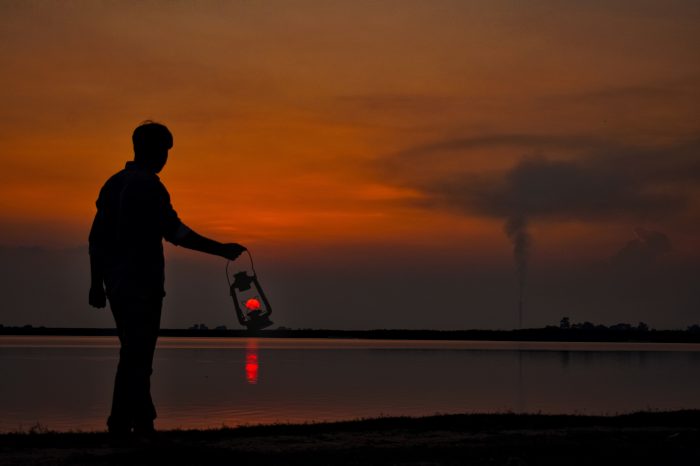Watching a nature show recently (narrated by David Attenborough, as the best ones are), I observed a family of emus crossing a stream in a forest.
There was one baby chick, however, that didn’t want to cross because the stream was relatively high and moving fast.
This one chick refused to cross, but the mom had all her other chicks on the other side of the stream and couldn’t go back to get the lost one because she’d be abandoning the rest. So, this little baby emu who wouldn’t step into the stream turned around and went back into the forest…alone.
At this point, I thought surely the baby was going to die since it was now separated from its mother, but I’ll spare you the suspense and let you know the chick got so scared being in the forest alone that it came running back to the stream and its family was still waiting on the other side for it to cross.
With the fear of the forest now overwhelming the chick’s remaining reservations about the dangers of the stream, this little chick walked right in and crossed successfully over all by itself.
The point of this story isn’t to provide a natural history on the life and trials of emus, but it’s a parable we can use for our own life. Almost all of us, to some degree, approach life in the same fashion as this chick, as I’ll explain further.
When something frightens us, our natural instinct is fight/flight/freeze. This emu obviously took to flight (although not literally, since they cannot fly) when faced with this particular danger, but I’m willing to bet if the danger facing the emu had been a predator approaching, it would likely try to hide by freezing.
Situations do not have to be a matter of life or death to initiate these instinctual reactions, however, as they happen to greater or lesser degrees whenever we’re faced with a potentially dangerous decision. The danger could be as simple as the fear of missing out (FOMO) on a trivial decision like whether to attend a dinner party or stay home.
Each of us has a different default reaction, although it can vary based on the specific circumstances. My personal go-to is freeze, although I’ve noticed I’m more likely to adopt a fight reaction when I’m confronted with criticism from another person, for example.
There is a Sufi story that reminds me of the emus though. It’s about a dog and a mystic sitting alone in a desert at an oasis where there is a pond. The Sufi is sitting there in contemplation watching this dog continuously approach the pond. When the dog sees its own reflection in the pond, it turns around and runs away. Then the dog comes back again, and does the same thing.
This continues for a bit, until eventually the dog gathers the courage and jumps straight in without reservations. It’s said upon watching the dog, the mystic became enlightened.
The Sufi realized he was doing the same thing with his own approach to life, never really committing 100 percent and jumping in. There was always some instinctual reservation holding him back, never willing to fully face and meet the moment. This flash of insight allowed him to shift from a default reaction to a thoughtful response for the given situation.
I have a dog, Hypatia, that freezes, especially when I first got her, because of a dreadful experience living in an animal shelter before I got her. She’s grown quite a bit these days and rarely goes back to her old ways. (It’s synchronistic that we both have the same default reaction, I suppose pets really do reflect their owners.)
While she still sometimes notoriously will freeze when faced with danger, she’s never hesitated jumping into a body of water. Being part Labrador, she doesn’t have the same reservations that the emu or desert dog did, and I attempt to emulate this in my own life.
It’s also heartwarming to see her meet challenges that would have previously frozen her in place, showing that you can, in fact, teach an old dog new tricks. I’ve learned a lot from Hypatia, and aside from books, I’ve probably learned more from her than just about anything else.
“Outside of a dog, a book is a man’s best friend. Inside of a dog, it’s too dark to read.” ~ Groucho Marx
What is it though, about watching the desert dog that shifted this Sufi’s consciousness, and similarly about the emu that we can also allow ourselves to shift?
It shows how when we approach life fully and meet each challenge willingly, we become fully alive.
When an obstacle that we must surmount to move forward arises and we refuse to face it, we most often come to find it wasn’t as scary as we originally thought.
Although I have no idea what ended up happening to that baby emu, I’m willing to bet the chick never balked at crossing a flowing stream with its family again, having gained the confidence of moving through a challenging situation.
If we can only realize we’re holding ourselves back in daily life too, when obstacles arise, we’ll see them as an opportunity to move through, as opposed to something to flee from.
“The best way out is always through.” ~ Robert Frost
Consider for a moment all the things in life that we are resisting either internally or externally, and see if they’ve actually brought more suffering by not facing them, as opposed to the pain it would temporarily cost to accept and move through them.
It’s possible to find with the knowledge that the general circumstance of our lives won’t go away if we don’t face them, that we’re willing to be more courageous and meet life fully.
Something that has helped me is to see if I can sit in the uncomfortableness for even just a few seconds before I turn away from something that I’d prefer not to face. It is similar to building a muscle with exercise, and the more frequently I flex this muscle, the stronger I get the next time.
Resisting life’s challenges is like trying to swim upstream when the natural current is taking us downstream. If we meet challenges without trying to avoid them, we will find how much easier it is to jump in and go with the flow.
~











Read 0 comments and reply